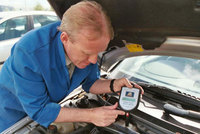Avoid the impact - 1 in 3 vehicles could suffer brake failure

The brakes on more than a third of all cars in Europe could fail without warning, according to a new report.
Research carried out for Cosan Lubricants’ Mobil Car Care range, at independent service garages across the UK found that 26.5% of UK motorists had defective brake fluid, with nearly one in 10 unintentionally risking their lives every time they drove.
The research tested the quality of brake fluid – the liquid that allows the modern braking system to work. Overall across Europe, 41% of vehicles are operating with sub-standard brake fluid.
Brake fluid absorbs moisture from the atmosphere, which reduces its effectiveness by lowering the boiling point. Once the boiling point dips beneath 180 degrees Celsius, brake fluid becomes increasingly ineffective, with the potential to cause sudden and inexplicable brake failure.
Brake fluid testing expert, Alba Diagnostics, recommend replacing brake fluid when its boiling point is reduced to 200 degrees Celsius. But, shockingly, some of the vehicles tested had brake fluid that boiled at only 130 degrees.
Table showing boiling points of braking fluid
Temperature °C - Percentage of Vehicles
<181 8%
181-200 18.5%
201-250 64%
>250 9.5%
The research found that even newer vehicles could be at risk when looking at the link between the age and mileage of a vehicle and the quality of its brake fluid. One in seven vehicles with less than 80,000 miles on the clock had fluid showing a boiling point of less than 200 degrees.
The study also revealed a worrying lack of understanding among motorists about how brake fluid functions, with three quarters of workshop customers either admitting they don’t know or giving an inadequate account when asked. More than a third (34%) had not changed their brake fluid for over two years.
The rest of Europe is not much better, with a total of 71% of motorists quizzed unable to explain how brake fluid works.
Mike Bewsey, of Cosan Lubricants, marketeer of Mobil Car Care products in Europe, said: “The poor quality of fluid that controls such a safety-critical vehicle component in the UK is alarming, as is the general lack of understanding about how it works. Unfortunately, once your brake fluid is contaminated, there’s no going back and there is a much greater risk that your fluid will boil. This can happen in stop-start conditions, under heavy braking or if you are towing something. It’s also very difficult to diagnose as a problem because, after an accident and once the fluid has cooled again, it will appear to be normal.”
The research suggests that the ‘phantom’ nature of brake fluid failure could account for thousands of accidents every year. But, while a visual fluid level check will be carried out during a vehicle’s MOT, quality testing is not part of the only vehicle check motorists are legally obliged to carry out.
Bewsey said: “Many drivers mistakenly believe that, if their car has passed its MOT, all of the lubricants and chemicals within it are up to scratch. But testing the boiling point temperature is the only way to check the quality of brake fluid. As that is not part of the MOT, the onus is clearly on motorists to make sure that their car is safe.”
Mobil Car Care has added two new premium brake fluid products to its range; Mobil Brake Fluid DOT 4 ESP and Mobil Brake Fluid DOT 5.1 are available from all good motor factors now.
You can avoid the impact of brake failure by asking your technician to check your brake fluid boiling point at your next service.




